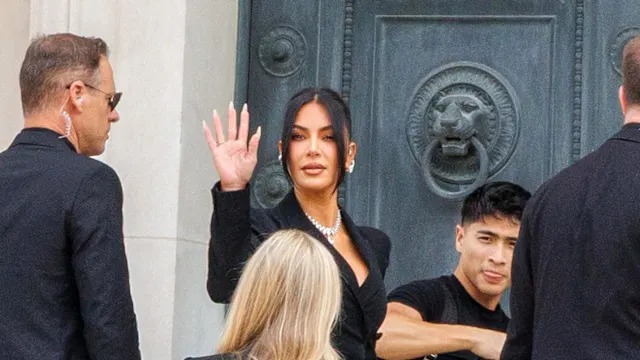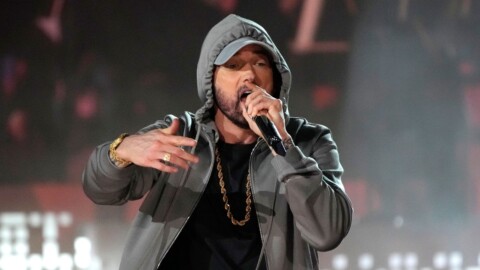Kim Kardashian’s voice trembled as she stood before the Paris court, recounting the night that changed her life forever.
It was October 2016, and she was in a luxury hotel suite in Paris when masked gunmen burst in, bound her, and pointed a gun at her head.
“I thought I was going to die,” she told the judges, her voice breaking. The court was silent as she relived the traumatic ordeal that saw her lose millions of dollars’ worth of jewelry, including a precious diamond engagement ring from her ex-husband, Kanye West.
Her eyes met the faces of the nine men and one woman on trial for the crime — her alleged attackers — as she gave her emotional testimony.
The tension in the courtroom thickened when one of the defendants, Aomar Ait Khedache, a 71-year-old man sitting just a few meters away from Kardashian, spoke.
“I regret everything that happened,” Khedache said, his voice heavy with remorse. For a moment, time seemed to pause. Kardashian looked directly at him, her gaze unwavering but softened by tears. “I do appreciate it, I forgive you,” she replied, her voice choked with emotion.
But the reality star quickly made it clear that forgiveness did not erase the scars.
“It doesn’t change the emotion, the feelings, and the trauma, and the way my life has changed,” she added, tears streaming down her cheeks.
Her testimony stretched on for more than three hours, at times interrupted by the apologies of other defendants. But the gravity of her words never wavered.
Kardashian, who has become an outspoken advocate for criminal justice reform in the United States, told the court that her dreams of becoming a lawyer had not softened the impact of what she endured.
“I was afraid I was going to be raped,” she admitted, her voice barely above a whisper. “I said a prayer, trying to mentally prepare myself.”
But what followed was even more terrifying — her legs were tied together, and a gun was aimed at her. “I was sure that’s when they were going to shoot me,” she revealed, her voice shaking.
She recalled how in those horrifying moments, her thoughts turned to her family. She feared her sister, Kourtney Kardashian, who had traveled to Paris with her, would walk into the suite and find her dead.
“I thought she would walk in and see that, have that memory forever,” Kardashian said, wiping tears from her face. When the judge, David de Pas, asked if she genuinely believed she was going to die, she answered in a quiet but firm voice, “I absolutely did think I was gonna die.”
Her words seemed to echo across the courtroom, leaving a heavy silence in their wake.
Kardashian also spoke of her desperate attempt to stay calm, even as she looked into the eyes of the man who tied her up, trying to memorize his features.

“He told me if I stayed quiet, I would be okay,” she recounted. But as the robbers grabbed her jewelry and fled the suite, she found herself alone, still tied.
Summoning every ounce of courage, she managed to free her hands from the cable ties and hopped her way down the staircase to the first floor, where her friend and stylist, Simone Harouche, helped untie her.
Together, they ran out onto the balcony, crouching behind bushes as they shouted for help.
But even when help arrived, Kardashian’s ordeal was far from over. As Parisian police officers burst onto the scene, she froze, gripped by a new wave of terror.
“I couldn’t trust them. The robbers were wearing police uniforms too,” she explained. Panic and suspicion gripped her as she tried to distinguish between real rescuers and potential threats.
It was a cruel twist in an already horrific night, one that would forever change her sense of safety and trust.
For the defendants, the sight of Kardashian standing before them — not just as a global superstar but as a survivor recounting her nightmare — seemed to weigh heavily.
But for Kardashian, this moment was about more than just seeking justice; it was about reclaiming her story and letting the world know that beneath the glamour and fame was a woman who faced unimaginable terror and lived to tell her truth.
As Kim Kardashian continued her emotional testimony in the crowded Paris courtroom, the judge leaned forward and asked a critical question: Why hadn’t her security been present at the time of the robbery?
The room grew tense as Kardashian explained that her usual security team had been assigned to accompany her sister, Kourtney, to a nearby club. “I stayed in that night. I didn’t think I needed security,” she admitted, her voice calm but tinged with regret.
Before the attack, she explained, she and her family had always felt safe in Paris. “We didn’t think we needed that level of security. We even had our team stay at a different hotel,” she said.
But Paris changed everything. Kardashian told the court that her sense of safety was shattered after that night. “Now, I can’t even sleep at night if I know there aren’t multiple security guards,” she revealed.
“I have a phobia of going out because I keep thinking people will see me out and know my home is empty.” The horror of that night left her not just traumatized but also paranoid about copycat attacks.
“My house in Los Angeles was robbed even before we got back from Paris,” she added, her eyes clouded with lingering fear.
Her testimony was interrupted multiple times by two of the defendants who had pleaded guilty, each attempting to apologize.
One of them, Aomar Ait Khedache, expressed his deep regret for his role in the crime. Kardashian looked at him and, after a moment of silence, replied, “I do appreciate it, I forgive you.”
But that brief moment of grace did not extend to everyone. She ignored her former driver, Gary Madar, who stood accused of tipping off the burglars about her location.
Madar, who denied the charges, stood just meters away, but Kardashian refused to even acknowledge his presence.
Her frustration deepened when the topic of Yunice Abbas, one of the convicted robbers, came up. Abbas had published a memoir in 2021 titled “I Held Up Kim Kardashian,” a move that left Kardashian both stunned and outraged.
“I was really shocked when I saw there was a book,” she told the court, her voice filled with disbelief.
“Not only did he do this, but now he’s making money off it — off my jewelry, my memories. The watch my dad gave me when I graduated high school… I can’t get that back.”
Her words hung heavily in the air, a poignant reminder of the personal losses she suffered beyond the value of the stolen items.
The trial was about more than just justice for Kardashian. It was also about closure. “I wanted to be a part of today because I am a victim in this case, and it’s the first time I’m able to really hear from everyone and follow along,” she explained.
Her tone was measured, almost lawyerly, reflecting her well-publicized ambition of becoming an attorney.
“This is what I do. I want to become a lawyer, and I do believe everyone has the opportunity to speak their truth. This is my closure and my opportunity to put this to rest after everything I’ve been through.”
But even with that sense of closure, the trauma of the experience was far from forgotten. Kardashian’s voice cracked slightly as she described the impact of the ordeal on her life.
“It was terrifying and life-changing, and I don’t wish that kind of terror on anyone — to think you could be killed or raped,” she said, pausing to gather herself.
“I wouldn’t wish that on my worst enemy.” Her eyes scanned the courtroom, and for a brief moment, the confident global superstar seemed just like any other woman who had survived a nightmare.
Her final words to the court captured the depth of her ordeal. “My job today is to tell my truth and to hope this doesn’t happen to anyone else,” she said.
“I have to live with the memory of what I went through, but at least now, I can speak out. I hope that by sharing this, I can prevent it from happening to someone else.”
As Kardashian stepped down from the witness stand, the room seemed to exhale with her, recognizing that beneath the fame and glamour was a survivor who had fought for her voice to be heard.







